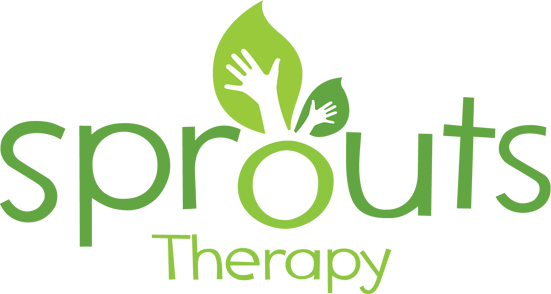Therapy in the Community

Therapy Opportunities Outside the Clinic!
In addition to our primary Waipio clinic, Sprouts Therapy utilizes various community settings to offer Speech, Occupational, Feeding and Physical Therapy. Current settings include: Private Pool (Hawaii Kai), Private Pool (Kahala), Community Pool (Ewa Beach Summer months), Farm (Waialua), and Home (various locations on Oahu).
*Currently only occupational therapy is offered at the pool location, other environments offer all three services. Please note all settings have limited availability, if you are interested in one of these settings, please contact our admin team and we will add you to the waitlist*
Therapy at the Pool!
Water offers five key qualities that make it an ideal setting for pediatric therapy: buoyancy, viscosity, hydrostatic pressure, warmth, and fun!
- Buoyancy, which is the upward force exerted by water, reduces joint stress and enhances balance and core stability. It lessens the fear of falling, encouraging children to work against the water's force to stay upright. Additionally, it supports floatation activities used for relaxation in order to decrease muscle tone and improve joint range of motion.
- Viscosity refers to how water molecules stick together, creating natural resistance that strengthens core and limb muscles. This resistance also enhances cardiovascular endurance. Adjusting movement speed in water alters the resistance, allowing control over the activity intensity.
- Hydrostatic pressure, the force water applies to a submerged body, offers a comforting 'squeeze' effect, helping individuals to tune out outside stimuli and feel more secure. It's particularly beneficial for children with sensory processing disorders, and aids in circulation enhancement as the body moves through water.
- Warm water temperature aids in relaxing muscle tone and minimizing involuntary movements that could hinder progress in a land-based therapy setup. It also boosts circulation by dilating blood vessels.
- And let's not forget—the pool is just plain fun! It's a joyful space for play, learning, and movement, making therapy a blast!
Pool Session Information
Required Attire
- Bring your child to their session in their swimsuit with a towel and water bottle.
- Hawaii Kai and Kahala location: We kindly ask that all pool clients utilize a different swimsuit in the pool than they do in the ocean in order to prevent the growth of algae in the pool
- Have your child use the restroom prior to arrival.
- Sunscreen should be worn while in therapy and be applied at least 15 minutes before the session's start time.
- Please inform your child's therapist if they are not yet potty-trained in-pool. Keiki who are not potty-trained should come wearing a non-disposable swimmer diaper.
- Siblings are not permitted in the pool during therapy sessions.
Pick-up and Drop-Off Policies:
- Hawaii Kai location: Clients are asked to park along the fence on Keka'a Street, located on the side of the residential property. Upon arrival, please walk in the front gate, walk on the grass around the corner.
- Kahala location: Clients may utilize street or driveway parking. Upon arrival please walk in the front gate on the right of the driveway and follow the path to the pool.
- Parents can drop-off and pick-up their child for their sessions, or wait in the waiting area around the pool. If you opt to drop your child off, similarly to our in-clinic protocols, parents will need to return to the pool 10 minutes prior to end time of therapy to pick up their child from their session (kindly note the therapists will be in the pool, which is why we ask parents to return poolside vs. wait in their car). We also ask that you stay within a reasonable distance from the therapy location should the need arise for you to return to the pool prior to pick-up time.
Therapy at Home!
A child's home represents their natural environment—a space where they engage in daily routines and activities crucial to them and their family. It's a familiar setting where exploration and learning occur effortlessly.
When a therapist visits a child's home, the adjustment is minimal—the child encounters a friendly presence in a familiar space. This quick adaptation lets the therapist witness the child's most relaxed and natural self, aiding in an accurate assessment of their abilities.
Working in the home environment allows the therapist to address functional goals using the child's furniture, toys, and equipment. It also enables the therapist to devise activities and home programs using readily available items.
Home Health may be available upon request based on therapist availability in your area.
Therapy at the Farm!
Outdoor play has physical, cognitive, and social emotional benefits and has a direct positive influence on children’s development.
Sprouts on the Farm, Nature-Based:
Occupational or speech therapy, nature-based sessions at the farm are held every other Mondays and will either be 1-hour long treatment sessions with an occupational therapist or 45 minute long treatment sessions with a speech therapist. In a typical therapy session, your child will participate in therapeutic activities that may include horse grooming, interacting with farm animals, bike riding, playing on a playground, gardening (from building, planting, caring and harvesting), and exploring (smells, textures, and feels) as a means to work on a variety of skill areas including cognitive, physical, sensory, adaptive and communication.
Sprouts on the Farm, Nature-Based with Equine Movement:
Occupational/physical/speech therapy sessions that incorporate equine movement are held every other Mondays and will be 1-hour long co-treatments with both either an occupational therapist or physical therapist (full hour) and a speech pathologist (45 minutes). In a typical therapy session, about 15 to 25 minutes of equine movement may be incorporated by the treating therapist(s). In addition, your child will participate in other therapeutic activities, which may include animal feeding and petting, horse grooming, gardening, sand/dirt play, swinging, wagon rides, bicycle riding and more!
Hippotherapy As A Treatment Tool
- The term hippotherapy refers to how occupational therapy, physical therapy and speech-language pathology professionals use evidence-based practice and clinical reasoning in the purposeful manipulation of equine movement to engage sensory, neuromotor and cognitive systems to achieve functional outcomes. (AHA Inc.)
- A therapist may choose to incorporate hippotherapy as a treatment tool if it is an appropriate means for the patient to achieve positive functional outcomes. This decision is reflective of the therapist’s profession, specialized training, clinical reasoning, and theoretical model of treatment. Each treatment plan is based on the therapist’s evaluation and the patient’s functional goals. The therapist selects a horse/equine movement to match the specific needs of the patient. During treatment, the therapist continually monitors patient’s adaptive response and modifies equine movement to provide an appropriate challenge that will support the patient in working towards their functional goals. (AHA Inc.)
- Statistically significant outcomes include improvements in patient balance, strength, mobility, gait, sensory processing and regulation, coordination, speech, language, communication, vocal intensity, and participation in daily activities. (AHA Inc.)
'Sprouts on the Farm' Session Information
Directions
'Sprouts on the Farm' takes place at a local ranch called Heart Horses, and is located at the following address:
65-670 Kaukonahua Road
Waialua, HI 96791
Upon driving down Kaukonahua Road, you will see a bike on the side of the road with a sign that says "Local Chocolate" and "Local Honey Ahead." Turn right here, onto the gravel road. You will see a log on the ground with the address 65660. Look for a gate on your right hand side that says "Heart Horses"! Enter the gate (you may need to open the gate upon arrival and close it behind you) and drive up the road until you reach the barn and you can park there. PLEASE DRIVE SLOWLY AS YOU APPROACH BARN...KIDS AND HORSES AT PLAY!
Required Attire/Equipment
Your child must arrive to each session with the appropriate clothing/equipment to ensure his/her safety while outside and in the sun:
- Water Bottle: We do not have potable water at the farm, so please bring your child their own water bottle. It is important to stay hydrated prior to and during the riding session. Water is the best way to hydrate!
- Sunblock: Please be sure to protect all exposed areas
- Helmets: Riding helmets are required during equine movement portion of your child's session. Helmets will be provided on site. If your child does not tolerate wearing a helmet, this skill will be incorporated into your child's therapy session. Please note that we do not assume any responsibility for safety performance of horse equipment and/or helmets.
- Close-toed shoes: We kindly ask all riders, and their accompanying parents/guardians to wear boots or sneakers only. Please refrain from dressing in sandals, flip-flops, or open-toed shoes, in case a horse steps on your toes!
- Long pants: Your child is required to dress in long pants that reach to mid-calf area or longer. Long pants protect against the horses hair/sweat and prevent chafing while riding.
- Clothes: Please refrain from using any loose clothing, raincoats, or ponchos.
- Hair ties (if applicable): Hair bands are preferred over hair clips to keep back any long hair. For clients with equine movement: Please have your child's hair secured in a low style so that a helmet can be put on (if it is pulled back).
Farm Session Policies
- Arrival & Check in: In order to limit the amount of clients in the space, please do not enter the property/gate earlier than 10 minutes prior to your session time. Upon arrival, please also do not roam freely around the barn without the direct supervision of a therapist. Please arrive with your child fully prepared for their therapy session (i.e. bathroom duties, clothing & equipment ready, etc).
- Speed Limit We kindly ask all visitors to follow a 5 MPH speed limit while driving on the Heart Horses property.
- Parking There are two parking lots that clients are welcome to park in: the higher-up parking lot near the barn or the lower parking lot near the horse arena. Kindly note that the parking space closest to the barn is reserved for clients with impaired mobility.
- Late Arrival For clients that have scheduled equine movement (hippotherapy time), if you arrive more than 15 minutes late to your scheduled session time, the equine movement portion of your session may be omitted.
- Observation of Therapy Sessions If you would prefer not to wait in your car during the session time, there are chairs located next to the lower paddock and arena for parents to utilize and observe their child's horse time. There are also chairs located in the grassy area outside of the barn that parents are welcome to use while waiting for their child's session. Parent(s)/Guardian(s)/Caregiver(s) must remain on site for the first few sessions, or until noted otherwise by your child's therapist(s). Clients with specific treatment plans that include specialized emergency procedures, medical prescriptions, or actions to be taken around behavioral issues must always have a parent or caregiver accompany them to each session.
- Supervision of Siblings Family, including siblings, and friends of our clients are welcome to observe treatments in designated areas, as long as it will not be a distraction. We kindly ask that all children/siblings are supervised closely while on the premises and that children/siblings refrain from using therapy equipment (i.e. bikes, toy cars, playground structure, swing sets, etc.) unless they are receiving therapy services. These guidelines ensure the smooth functioning of our therapy sessions while maintaining a safe and focused environment for all individuals involved.
- Pet Policy No pets allowed on property, with the exception of certified service animals.
- Therapy Sessions Ending Time Please make sure parent/caregiver is back at least 10 minutes before the scheduled end time of the session.
New client?
All Rights Reserved | Site by Fix8 Media

